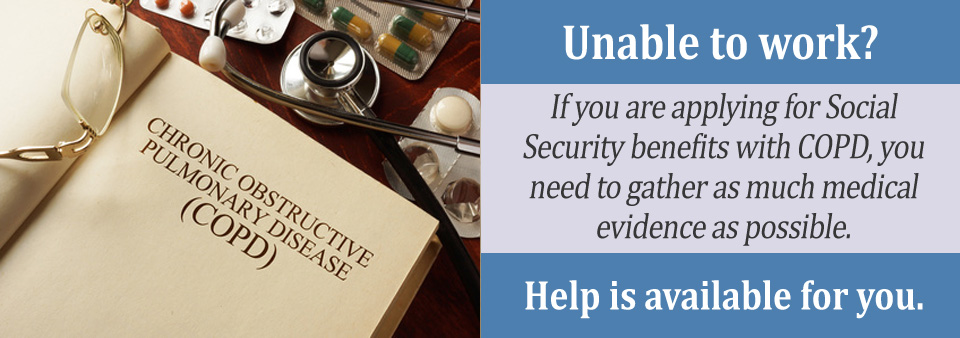For individuals suffering from breathing problems, meeting the demands of a job can be difficult, if not impossible. Chronic Obstructive Pulmonary Disease (COPD), is one such respiratory disease that impacts close to 16 million Americans.
If you or a loved one has COPD, there may be financial resources available. If your COPD causes you to be out of work for at least 12 months, then yes, you could qualify for Social Security Disability Insurance (SSDI).
SSDI benefits are for those who could work full time at one point, but now are unable to because of a serious disability such as COPD. Those who apply for disability with COPD more likely than not will qualify for SSDI, as opposed to Supplemental Security Income (SSI), which is for those with severe disabilities with very little income.
A diagnosis of COPD alone is not always enough to earn an award for financial assistance. To be considered disabled, you will need to provide sufficient medical evidence, such as a medical report to the Social Security Administration (SSA) to illustrate that your COPD is severe enough to earn disability.
When you apply for SSDI with COPD, in order to be approved, you need to meet a certain medical criteria outlined by the SSA. If you successfully do this, it can be one of the most important signs your disability claim will be approved.
That medical criteria will need to be supported by sufficient medical evidence that shows that your COPD is severe enough that you cannot work.
Once an individual is approved for SSDI benefits, they can use that money to spend on medical treatment and medicine related to COPD, as well as basic day-to-day need. Below is more information on the medical criteria needed to help qualify you for disability benefits.
The burden of proof falls on the disability applicant to prove that you are unable to work due to your COPD diagnosis through medical criteria. Your ability to provide this evidence in a timely and accurate fashion will enhance your chances for benefit approval.
Is COPD A Disability?
Yes, COPD is considered a disability by the SSA if your COPD affects your ability to work full time and affects your day to day life.
You will need to provide evidence that your COPD meets a Blue Book listing in order for it to be considered a disability.
If you have COPD, the SSA will consider your condition to be a disability if you are able to meet the work and medical requirements outlined to qualify for Social Security disability benefits.
If you have earned enough work credits from working and if you meet the criteria for COPD listed in the SSA’s Blue Book of disabling conditions that qualify for Social Security disability benefits.
The SSA defines a disability as the inability to engage in what they called substantial gainful activity, which is work that involves significant and productive duties and pays more than the current monthly income limits set by the SSA by reason of any physical or mental impairment(s) which has lasted or can be expected to last for a continuing period of 12 months or more or result in death.
Does COPD Qualify for Disability?
COPD does qualify for disability under the chronic respiratory disorders section of the SSA’s Blue Book.
If your COPD is able to match the chronic respiratory disorders section of the Blue Book, which is section 3.02, then you may be able to get disability for COPD. The Blue Book is the list of conditions that qualify for disability.
Therefore, your condition may also be assessed under the cardiovascular system (4.00) of the Blue Book.
To help you with the information gathering process, here is the most relevant medical evidence that you will need to provide to give you the best chance of being approved for disability.
If you are able to meet the medical listing and have enough work credits, then the SSA will consider your COPD a disability and you may be able to qualify for disability benefits.
To help you with the information gathering process, here is the most relevant medical evidence that you will need to provide to give you the best chance of being approved for SSDI.
Medical Criteria For Getting Disability With COPD
The first type of medical criteria that the Blue Book (which is the list of disabilities that qualifies for disability benefits) directly requests is a complete medical history of your COPD.
You should be able to provide the following records from your physician or pulmonologist should include your presenting symptoms, the progression of your lung disease, as well as the results of a full physical examination.
Several tests will help to confirm your diagnosis, and the following should be included in your records:
- Arterial Blood Gas
- Pulse Oximetry Levels
- Imaging tests that may show evidence of COPD, such as a chest x-ray or CT scan
- Documentation of your use of supplemental oxygen, including the flow rate
- Pulmonary (Lung) Function Tests
- Spirometry results
- ABG tests
- Pulse oximetry
- Records of hospitalizations
While any doctor can provide this information, the SSA gives more weight to the opinion of medical specialists. Therefore, you should work with your pulmonologist to gather all of your medical evidence.
Medical Criteria Needed Related to Affected Body Systems
Cardiovascular System (4.00) – Those with COPD sometimes experience difficulties with their heart due to the decreased oxygen levels. As a result, you may need to provide the following evidence of heart problems:
- ECG results
- Stress test results
- Echocardiogram results
- Evidence of chest pain (angina), history of fainting (syncope) history of a heart attack, or a cardiac catheterization
Pulmonary Function Tests Needed to Get Disability with COPD
Pulmonary function tests are noninvasive tests that show how well the lungs are working. The results from this test can help show the SSA that your COPD is severe enough that it will force you to be out of work for at least 12 months.
There are a couple of pulmonary function tests that can help show the severity of your COPD. If just one of these tests shows a severe limitation in lung function, then you may be able to qualify for disability benefits. These tests include:
- Spirometry Test: A spirometer is a device with a mouthpiece hooked up to a small electronic machine. This measures your lung’s ability to expel air when you breathe. It’s determined using FEV value, or “forced expiratory volume”
- Plethysmography Test: Show's how much air is in your lungs after you take in a deep breath. It’s used to compare your lung function with known standards that show how well your lungs should be working.
These pulmonary function tests can help measure and show the affects and severity of your COPD. If you are applying for Social Security Disability Benefits with COPD, having these tests to include with your SSDI application can really help show the SSA that your COPD is so severe and that you can no longer work.
Evidence Needed Related to Your COPD Treatments
Alongside with the medical criteria needed to qualify for COPD disability, the SSA also needs evidence related to your treatments.
The SSA will need to know what treatments you have received, your response to those treatments, and most importantly if your respiratory status has worsened despite those treatments.
Be certain that your doctor has documented the following:
- Medications that you are receiving, such as bronchodilators, inhaled steroids, and antibiotics, as well as your response to the medications:
- Respiratory therapy or pulmonary rehabilitation that you may be receiving
- Supplemental oxygen needs, especially if your needs have increased
- Any surgeries or procedures that you may have had, including operative notes or pathology reports, if applicable
- Any related medical complications, such as weakness, neurological complications, heart problems, or intellectual difficulties
The Blue Book notes that not every patient who has COPD will meet the listing, but you may be unable to work regardless. For example, you may experience dizziness, fainting, or excessive and unintentional weight loss.
 While these symptoms are not listed in the Blue Book under section 3.02, they may still impede your ability to work.
While these symptoms are not listed in the Blue Book under section 3.02, they may still impede your ability to work.
Additionally, medications that you are taking such as steroids or bronchodilators may come with side effects.
Providing this information to the SSA is of vital importance. If you can prove that your condition is so severe that you are unable to work in the upcoming year, you may be considered for disability assistance.
Evidence Needed Related to Your Quality of Life and Ability to Care for Yourself
Many people with COPD do not qualify for SSDI benefits through the Blue Book respiratory listing. However, you still may be too ill to work. If that is the case, then you need to show that your quality of life is severely impacted by your COPD.
Your pulmonologist should provide physician notes documenting his or her opinion regarding your limitations and inability to function without unscheduled breaks or days off.
The more specific that your doctor is about your limitations, the better your chances are of being approved for disability benefits. If you are unable to work due to limitations from your disease, you may still qualify for disability through a residual functioning capacity assessment.
Steps You Can Take to Win Your Disability Claim
If you are currently in the process of applying for SSDI, or if you were denied benefits in the past, getting your medical evidence in order is the most important step that you can take to win your disability claim for COPD.
The entire Blue Book is available online, and the section on Respiratory Illness is quite detailed, so you may want to review section 3.00 with your pulmonologist to determine what medical records you have on hand, and what may need to be supplemented to be approved.
You may need to contact the medical records office at your hospital to obtain some of this information.
While you don’t need to provide medical documentation to the SSA yourself, it is helpful to be as organized as possible. When you visit your doctor, it is a good idea to present a written list of symptoms and side-effects that you are experiencing.
Considering applying for Social Security disability benefits but not sure how much you’ll earn per month? Our Social Security Benefits Calculator can help you determine how much you’ll receive from the SSA before you file for disability
A Social Security disability attorney or disability advocate can assist you in ensuring that your claim for disability is thorough, thus increasing your chances for approval.
Consider a Free Evaluation with a Social Security advocate or attorney in your area today—Disability lawyers are only paid if you win your COPD claim.
Common Questions For People Applying For Disability with COPD
There are many questions that people have when applying for disability with COPD. Common questions include ones about eligibility, SSDI vs SS, how much they will be able to earn, how long does the process take, etc.
Below are a list of common questions that people have regarding COPD and disability.
What Are Eligibility Requirements For SSI With COPD
According to the SSA, to be eligible for the SSI disability benefits program, you are normally required to meet all of the following requirements:
- be blind, disabled, or age 65;
- have a limited income and assets;
- be a United States citizen, or national or a lawfully permitted alien;
- live in one of the 50 states, the District of Columbia (Washington, D.C.), or the Northern Mariana Islands, except for a child of military parent(s) assigned to permanent duty anywhere outside the United States or certain students who reside temporarily abroad.
 There are some other factors that may affect your eligibility for SSI. Marital status is of these “other” factors that may, and likely will, affect your eligibility for SSI because you may be sharing the income of a spouse, parent, or another member of your household.
There are some other factors that may affect your eligibility for SSI. Marital status is of these “other” factors that may, and likely will, affect your eligibility for SSI because you may be sharing the income of a spouse, parent, or another member of your household.
In 2023, SSI’s standard payment amount for limited income beneficiaries (i.e., recipients of SSI) was a monthly income of up to $914 for an individual or $1,371 for a couple in which both spouses are beneficiaries of SSI.
What Are Eligibility Requirements for SSDI With COPD
You may qualify for SSDI if you have accumulated sufficient work credits before becoming disabled by your COPD.
The number of work credits you acquire is dependent on your age, as well as how many years you have previously worked and paid payroll taxes.
For example, if you are under 24 years-old, you may qualify for SSDI if you have 6 work credits earned in the 3-year period during which you previously were able to, and did, work that ended when your disability (i.e., COPD) began.
Conversely, at age 31, or older, you may be required to have earned at least 20 work credits in the 10-year period immediately before the start of your disability in order to qualify for SSDI.
This increase in the work credit requirement dependent on age is due to the fact that, generally speaking, the older you are, the more likely you are to have worked for a longer period of time compared to someone who is younger than you.
How Much Can You Make on Disability with COPD?
You are able to earn up to $3,627 per month on disability with COPD.
While the exact amount varies from case to case, the average disability payment in 2023 is around $1,384/month. How much you will be able to get depends on how long you worked and the specifics of your case.
A disability lawyer will be able to tell you how much in disability you can get.
How Long Does it Take To Get Disability for COPD?
After you send in your initial application if you are applying for Social Security disability benefits, it usually takes the SSA between three to five months to get back to you with a decision whether or not your disability claim for COPD was accepted or denied. Be sure to look out for the signs that you will be denied for disability.
If the SSA approves your claim, your benefits should begin within a few months. If you waited for more than five months to get approved, you will be awarded back pay on top of your monthly benefits.
 Back Pay refers to Social Security Disability benefits that you would have received had your claim been approved immediately.
Back Pay refers to Social Security Disability benefits that you would have received had your claim been approved immediately.
The SSA calculates Back Pay is related to the date you filed your disability claim and the date that they decide that your disability began, also known as the “established onset date.”
So, depending on the severity of your COPD, to get disability for COPD it could take anywhere from a few months to upwards of a year.
Conclusion
Qualifying for disability with COPD requires numerous medical criteria that you need to include in your disability application when you apply for disability.
The more medical evidence that you have that shows the SSA that you can’t work anymore because of your COPD, the more likely you are to qualify for disability.
Knowing which medical evidence you need for your application can be a challenge, which is why you should seek the help from a disability attorney.
A disability lawyer will be able to tell you what you need to include in your application in order to meet the medical criteria needed to get disability with COPD.
Take our Free Disability Evaluation to get connected with an attorney who can take a case in your area.
Additional Resources
